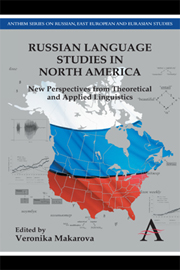Book contents
- Frontmatter
- Contents
- List of Tables and Figures
- Introduction
- Part One Language Structures and their Interface
- Part Two Applied Linguistic and Sociolinguistic Analysis
- 6 Communicative Language Teaching and Russian: The Current State of the Field
- 7 Low-Proficiency Heritage Speakers of Russian: Their Interlanguage System as a Basis for Fast Language (Re)Building
- 8 Superior Speakers or “Super” Russian: OPI Guidelines Revisited
- 9 Who Am I?: Cultural Identities among Russian-Speaking Immigrants of the Third (and Fourth?) Wave and their Effects on Language Attitudes
- 10 Russian Language History in Canada. Doukhobor Internal and External Migrations: Effects on Language Development and Structure
- Afterword
- Index
7 - Low-Proficiency Heritage Speakers of Russian: Their Interlanguage System as a Basis for Fast Language (Re)Building
from Part Two - Applied Linguistic and Sociolinguistic Analysis
Published online by Cambridge University Press: 05 November 2012
- Frontmatter
- Contents
- List of Tables and Figures
- Introduction
- Part One Language Structures and their Interface
- Part Two Applied Linguistic and Sociolinguistic Analysis
- 6 Communicative Language Teaching and Russian: The Current State of the Field
- 7 Low-Proficiency Heritage Speakers of Russian: Their Interlanguage System as a Basis for Fast Language (Re)Building
- 8 Superior Speakers or “Super” Russian: OPI Guidelines Revisited
- 9 Who Am I?: Cultural Identities among Russian-Speaking Immigrants of the Third (and Fourth?) Wave and their Effects on Language Attitudes
- 10 Russian Language History in Canada. Doukhobor Internal and External Migrations: Effects on Language Development and Structure
- Afterword
- Index
Summary
Introduction
The focus on heritage learners in second language acquisition studies is a relatively recent development (e.g., Brinton, Kagan and Bauckus 2008). There is a significant distinction between heritage and foreign language acquisition – the former beginning at home, while the latter takes place in a classroom (UCLA Steering Committee 2000, 339). The establishment of heritage language education as a valid and distinct research field at the turn of the twenty-first century was a landmark event in second language acquisition and foreign language education (Valdés 1995; Peyton et al. 2001; Kagan and Dillon 2001; Lynch 2003). Heritage language studies provide a crucial link between second language acquisition and bilingual education by focusing research attention on the nature of language acquisition by both children and adults; on the revival of the mother tongue; on the unique characteristics of heritage speakers; and the challenges their bilingualism poses for language instruction (Krashen 1998; Andrews 1999; Campbell and Rosenthal 2000; Valdés 2001, 2006; Douglas 2005; Hornberger and Wang 2008; Brinton 2008). Today, heritage Russian speakers constitute a diverse growing population in American and European language classes, which makes Russian an important part of heritage language studies (Brecht and Ingold 1998; Andrews 2000; Zemskaya 2001; Polinsky 2000, 2004, 2006; Polinsky and Kagan 2007; Kagan 2008; Davidson 2010).
The term heritage speaker or heritage learner, though relatively recent, is becoming more widely used since its first appearance in the Standards for Foreign Language Learning (ACTFL 1996).
- Type
- Chapter
- Information
- Russian Language Studies in North AmericaNew Perspectives from Theoretical and Applied Linguistics, pp. 161 - 192Publisher: Anthem PressPrint publication year: 2012
- 2
- Cited by



